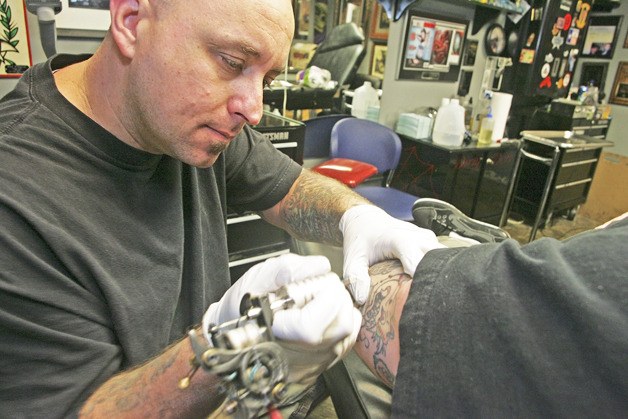Action Tattoo owner and artist Rich White doesn’t mind a little regulation. Indeed, he welcomes it.
“I think it’s high time they had some sort of regulation, I just wish they had approached it more on the health and safety of the general public rather than the financial security of the state,” White said. “I think there could have been a happy medium there.”
As of July 1, Washington State law has required that all tattoo and body piercing artists pay a $250 licensing fee as individuals, as well as $300 to license the business itself. For Action Tattoo’s artists, who work as contracted artists rather than shop employees, this means they must pay both the $250 and the $300 business license, adding up to $550 each to continue to work in the state.
The law, the direct result of Senate Bill 5361, sponsored by Sen. Jim Kastama (D-Puyallup) and co-sponsored by Sen. Pam Roach (R-Auburn), among others, initially sought to regulate the tattoo and piercing industry and provide health and safety standards to protect consumers. At least that’s how White understood it.
But when the Legislature finally passed the bill and Gov. Chris Gregoire signed it into law, White said it became apparent that it was all about adding revenue to the state’s coffers.
“As it all came to be, we noticed that it wasn’t the health department that was doing it, it’s all the licensing department,” White said. “The health department has nothing to do with it. It’s just a way to generate a couple of million dollars a year for the state.”
“When they decided to put some regulations in effect, we all thought it was for the good of the public health, safety and education,” Chris Johnson, the resident piercer at Action, said. “We all thought it was going to be about that. We thought they were going to go after people who tattoo in their homes to protect us and set some higher stands for shops. Well, it turned into a couple-year battle, and the end result was, ‘OK, get some insurance, pay us a couple hundred bucks, and you can have a license.’ So it really went nowhere. Except now we have to pay a lot of money every year to work.”
Although the bill does require licensees to take an online bloodborne pathogens test (diseases such as hepatitis B and C and HIV that are transmitted by contact with blood), both White and Johnson said it’s not enough to stop what they see as the main health risk of tattooing and piercing – “scratchers” or unregulated artists who typically work out of their homes.
“The people who are tattooing and piercing out of their house, the ‘scratchers,’ there are no penalties for them,” Johnson said. “But if we don’t have our license on the wall, we’re going to get a big fine. I was really hoping to see this license stuff prevent some of the bulls**t we see going on. We see people bringing their kids in who are getting tattoos in high school at friends’ houses. We see staph infections and MRSA. We’ve seen all sorts of bad stuff.”
Problems on the horizon
White said he’s concerned that once the state’s Department of Licensing begins to enforce the regulations, it will push tattooing and piercing back underground.
“They’ll just start doing it the old school way, where they’re doing it out of their house because they don’t want to shell out the $550,” he said. “And that generally leads to a lack of cleanliness. Not everybody has an autoclave (a device used to sterilize by using high pressure steam). Not everybody buys disposable or new tubes or needles. So what you’re going to see is a lot more competition locally in the houses, cheaper tattooing.”
For Roach, who first entered the fray to regulate the industry a decade ago, the push to license artists is a step in the right direction.
She also acknowledges the problem with “scratchers.”
“This is a consensus bill that took many years to pass,” she said. “The only place now that you’re going to get a tattoo without a license now is prison art or kids playing with lead pencils and other different ways of getting them (tattoos).”
Roach continued:
“In any endeavor there will be people that will try to avoid regulation,” she said. “If you are a consumer, do you want to go to someone who has a backroom operation, or do you want to go to somewhere where the proper antiseptic practices are being followed? Would you go to a non-licensed contractor to put a new bathroom in?”
White said that while he has problems with the high cost of the licensing compared with those for other industries – citing the low $25 application fee and $55 annual licensing required by barbers and hairdressers in comparison – he recognizes the importance of licensing his industry.
“It helps us in our legitimacy when people come in and see the license on the wall,” White said. “I get it. When I want some electrical work on my house, I want someone who is responsible, licensed and bonded. Tattooing is even more extreme. I get it.”


